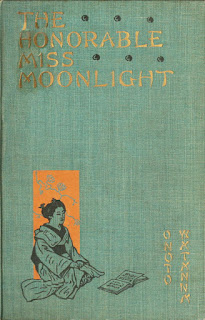 |
| Click to Download eBook |
The Honorable Miss Moonlight by Onoto Watanna is about the kind of love that consumes your present life and promises to haunt you in the afterlife. I believe love to be the most exalted of human emotions. However, I am not so sure about the existence of the afterlife. But it’s not about what I believe. It’s about what the Japanese people believed in post World War I era. So let’s continue with the story.
Young Lord Saito Gonji is the sole heir of the noble Saito family of Japan. His family and relatives arranged his marriage with an orphan girl called Ohano. Most of her life she lived in the Saito household, therefore she was more like a daughter to Lady Gonji. Because of her noble birth, the relatives of Lord Gonji, especially the ones from his mother’s side, approved of this arrangement. Though Lord Gonji had played with her when he was a child, having her as a wife had never crossed his mind. He had the image of a perfect wife in his mind and Ohano came nowhere near it. Gonji looked upon the new, grown-up Ohano with some aversion.
Ohano was plump, with a round, somewhat sullen face, a pouting, full-lipped mouth, and eyes so small they seemed but mere slits in her face. She had inherited the inscrutable, disdainful expression of her lofty ancestors.
That’s when the that of Miss Moonlight, a.k.a. the Spider from the House of Slender Pines crossed his path. She was the most celebrated geisha in Kioto. She was called the Spider because of her peculiar dance style. She was invited to perform in the illustrious house of Saito. Here young Lord Gonji, who till now was troubled by the visions of Ohan, saw her. He was mesmerized.
Every gesture, every slightest flutter of her sleeve, her hand, her fan, every smallest turn or motion of her bewitching head, was directed at the guest of honor, the son and heir of the house of Saito.
He proposed Moonlight. This created a great upheaval in the Saito family. A geisha, they said, was trained to entertain men, not to marry and bear children. Besides, it would bring disgrace to the honorable Saito family. Young Lord locked himself in his room and pined away for geisha Moonlight. The only person who sympathized with him was his father Lord Ichigo, who finally decided to take matters in his hand. He tried to convince the relatives. When that possibility looked dim, he exercised his authority. He loved his son. Miss Moonlight was married to Lord Gonji. That was when the bad things started happening. Lady Gonji and Ohan, who still lived there, never missed a single opportunity to make the life of Moonlight miserable. A year passed after their marriage without their having any children. That too became a cause of her suffering. There was little Lord Gonji could do to help her. She remained an alien in Saito house till one day, Lady Gonji decided it was time for the Spider to leave.
In The Honorable Miss Moonlight by Onoto Watanna, love was ceaselessly persecuted, repeatedly tested and then finally liberated. Miss Moonlight bore every torment with patience for the sake of the one person she loved. Gonji’s love for Moonlight stood the test of time. Though initially, he yielded to the family’s demand and married Ohan, it was impossible for him to forget his one true love. When the war broke out, Gonji willingly joined the force, as if to flee from the presence of Ohan, the memories of Moonlight and from his own helpless existence.
Onoto Watanna’s The Honorable Miss Moonlight has frequent references to prevailing Japanese culture. There are many Japanese words that the author deliberately left untouched. A proper translation could perhaps make the book more comprehensive, but that would definitely take away the essential cultural flavors from the story. It may be interesting to note that this book, though it may appear as a translated work, was written in English in its original form. This, along with the true identity of the author, I will discuss shortly. But first, let me point out the only thing I didn’t like about this book.
After returning from war, Gonji renewed his search for Moonlight. He scoured the disreputable neighborhood of Yoshiwara, scanned every face of its inmates hoping to find his lost love. He remembered the words of a certain American officer he had met in Manchuria.
“No nation,” the American had said, “can honorably hold its head erect among civilized nations, no matter what its prowess and power, so long as its women are held in such bondage; so long as its women are bartered and sold, often by their own fathers, husbands and brothers, like cattle.”
A realization dawned on him. Yoshiwara, he decided, should be abolished.
This, and the revision of the inhuman and barbarous laws governing divorce, should be his life-work.
This is where I took an uneasy pause. I had nothing against the noble realization of Gonji. He took it upon himself to change the discriminatory laws. That was all very well. But why did he have to wait until reminded by an American officer? What happened to his own morality? To me, it was like a subtle comparison between American ethics and Japanese traditions, in my opinion, was not only unnecessary but also unfair. I am not saying it was a great failing or anything. I just found it kind of amusing.
Onoto Watanna, though her name may sound Japanese to most of us, was a Canadian author. Her real name was Winnifred Eaton. In America, in the year 1912, when The Honorable Miss Moonlight was published, women were not allowed to vote, own property or even work outside home if they were married. However, it was also the time when the Suffrage Movement started taking shape.
Back to Literature and Fiction Bookshelf

